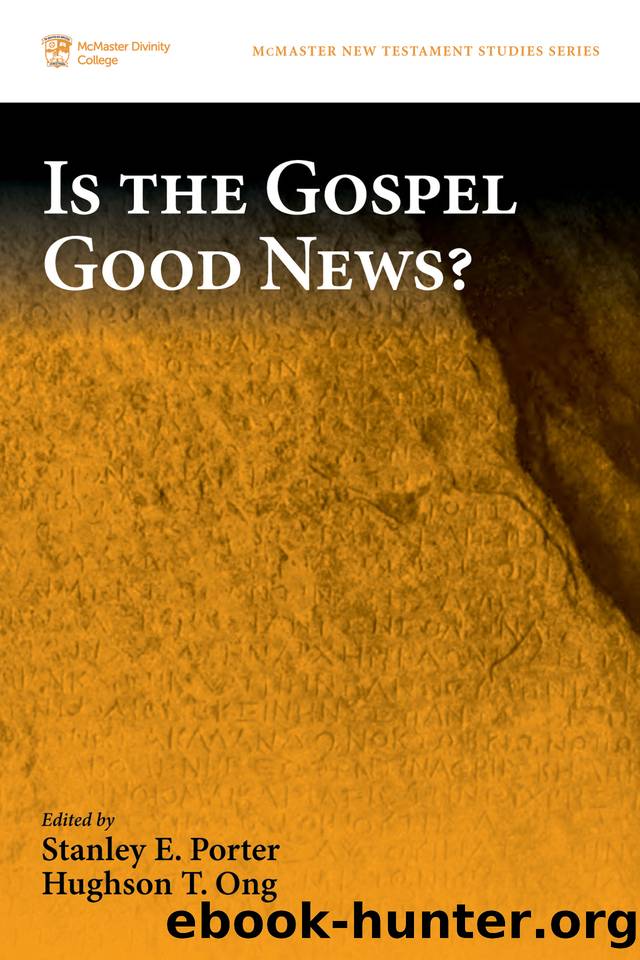Is the Gospel Good News? (McMaster New Testament Studies Series Book 8) by Porter Stanley E

Author:Porter, Stanley E. [Porter, Stanley E.]
Language: eng
Format: epub
Publisher: Pickwick Publications, an Imprint of Wipf and Stock Publishers
Published: 2019-05-19T00:00:00+00:00
Theology
9
âThe Word Became Flesh â
Christian Theology and Science as Coinherent, Not Conflicted . . . A Post-Intellectual Approach
W. Ross Hastings
Introduction
I have found over the years of playing the occasional golf game (with people I do not know) that it is best to try to keep my vocation as a pastor or professor of theology a secret. On one occasion on Burnaby Mountain, one chap I was joined with swore like a trooper all the way through the first nine holes, which he played abominably. A blue hue followed him everywhere he played a shot. At the tenth, he found himself under a tree, swung with full abandon, and wrapped his shaft around a branch. After taking swears and cusses to a new level, he turned to me, and I kid you not, in his next breath asked me, âSo what do you do for a living?â I told him that I played a lot of rugby and was used to this kind of language and that it was really a matter between him and God anyway; he was not much put at ease. When I told him that I have a Ph.D. in chemistry and that my first career was in science teaching before becoming a pastor and theologian, he looked utterly bewildered. He then said what is almost always said to me in this situation, âHow do you put those two things together?â That is the question I want to try to answer in this paper.
When it comes to the relationship between science and the Christian faith, Denis Lamoureux, in his book Evolutionary Creation , has reflected what I am afraid is the sad truth: Bad theology and bad science have characterized the Christian tradition, and we have not learned from it! Lazar Puhalo, Orthodox theologian and scientist, believes that a primary reason for the conflict model has not so much been modern science, as if it were some kind of âinternational plotâ to overthrow Christianity; it is rather the âbadâ scholastic theology of the West in both the Catholic and Protestant traditions and a fundamentalism that is present especially within the latter. These Western traditions, he asserts, were shaped more by the influence of Greek philosophy, specifically that of Aristotle through Islamic philosophy and of Neoplatonism through Augustine and his âanalogy of being.â Puhalo states that âAristotle had written on the essence of natural mechanisms, but he favoured the search for truth in philosophical processes rather than experimental ones. It was Aristotelianism that formed the dogmatized canon of âscientific fact,â or at least the canon of acceptable thought.â 343 He insists that under scholasticism, philosophy sat over both science and theology, the former being determined by presuppositions about the unchangeable and static nature of the cosmos and by misreadings of Scripture and the latter being determined by philosophyâs idolatrous reductionisms concerning God, robbing humanity of its relationship with creation and its formation through the empirical discoveries about creation through science. Puhalo does acknowledge that the systematic reasoning process
Download
This site does not store any files on its server. We only index and link to content provided by other sites. Please contact the content providers to delete copyright contents if any and email us, we'll remove relevant links or contents immediately.
The Lost Art of Listening by Michael P. Nichols(7490)
Why I Am Not A Calvinist by Dr. Peter S. Ruckman(4148)
The Rosicrucians by Christopher McIntosh(3510)
Wicca: a guide for the solitary practitioner by Scott Cunningham(3167)
Signature in the Cell: DNA and the Evidence for Intelligent Design by Stephen C. Meyer(3127)
Real Sex by Lauren F. Winner(3014)
The Holy Spirit by Billy Graham(2944)
To Light a Sacred Flame by Silver RavenWolf(2814)
The End of Faith by Sam Harris(2733)
The Gnostic Gospels by Pagels Elaine(2527)
Waking Up by Sam Harris(2454)
Nine Parts of Desire by Geraldine Brooks(2358)
Jesus by Paul Johnson(2352)
Devil, The by Almond Philip C(2324)
The God delusion by Richard Dawkins(2305)
Heavens on Earth by Michael Shermer(2278)
Kundalini by Gopi Krishna(2180)
Chosen by God by R. C. Sproul(2161)
The Nature of Consciousness by Rupert Spira(2102)
